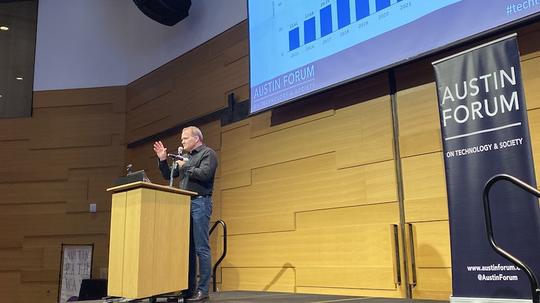
It might feel like we're innovating out of control. Data is being churned out at an exponential rate, AIs are getting smarter every nanosecond and nearly everyday we get a glimpse at an almost sci-fi like advancement in technology.
A few decades ago, inventor R. Buckminster Fuller estimated human knowledge was doubling every year or so. These days, IBM estimates human knowledge is now doubling every 12 hours, Jay Boisseau, an AI & HPC tech strategist at Dell Technologies and director of the Austin Forum on Technology & Society, told a crowd at the Austin Central Library on Tuesday evening.
“If things are changing fast, you have to adapt faster," he said during the Austin Forum on Technology & Society's tech trends presentation.
The annual presentation highlighted a variety of technologies and explained why they're poised to be a big deal in the year ahead -- although Boisseau and his co-presenter, Jay Williams, CTO of Quantum Materials Corp and a veteran technologist, noted many of these trends started years ago and will continue for years to come.
Williams, meanwhile, noted that while human knowledge is expanding rapidly, disinformation and fake news on social media acts as a drag on that progress.
Here are a few snapshots of some of their observations:
Cloud computing will mature and scale more in 2020, as cloud capabilities expand and private and public clouds connect in new ways.
AI will continue to accelerate as data improves and more apps connect to the cloud, including everything from the camera on your smartphone to Amazon's Alexa assistant in the kitchen. "As consumers, we're experiencing AI everyday," Boisseau said.
As cavemen, humans wanted to know what’s going on, what's coming next (such as weather) and how to prepare. That hasn't changed -- only we now have AI that can manage some of these things.
Edge computing, where analysis and decisions are made on premise by a device or sensor, will help decentralize data. Autonomous cars are an example since their reactions can be processed in the vehicle's computer instead of relying on the cloud. Meanwhile, autonomous cars will become the norm. “There are some things they (AIs) do better. There are many things we do better. I don’t think driving will be one of those for much longer," he said.
Blockchain, or perhaps more specifically distributed ledgers, will continue to prove their value. Meanwhile, Williams noted that in 2017 he shared a slide about cryptocurrency values and many people thought it could never be sustained. Meanwhile, Bitcoin improved from around $1,000 to $7,793 as of Tuesday. "There's no other financial investment vehicle that has appreciated that much in 36 months," he said.
Cybersecurity will continue to boom as more breaches are reported and the world increasingly puts its valuable data online. "When everything on your system is valuable, more people are trying to steal it," Boisseau said. Williams said that the amount of email and accounts many of us have accumulated has become unmanageable, and that we're increasingly subject to having our personal data shared by all kinds of people. Meanwhile, he said deepfake videos have already been used to alter public opinion and that they will continue to be used. Soon, he said, we'll need to identify fake avatar AIs from real people to know who is who.
Quantum technologies probably won't have their breakthrough year in 2020, but it will be the beginning of an extended breakout for super powerful computing. Williams said that quantum sensors are already being tested to carry vaccination information in your epidermis and to detect chemical changes inside pipelines that could help predict and avoid explosions. Meanwhile, he even noted that quantum dots may one day help us identify and filter the particles we breathe, perhaps helping us cut down on Central Texas' season allergies.
5G communications are hitting the cell phone market, but soon it will be used for other applications that are more impactful.
AR/VR: Boisseau said VR continues to go through fits and starts. Meanwhile, he expects AR to find sustainable and established success stories in 2020.
Gene editing: We're at the cusp of some breakthroughs, but most of the big benefits will come a few years down the line.
The Austin Forum on Technology & Society plans to dive deeper into several of those topics during its 2020 events. Learn more here.








